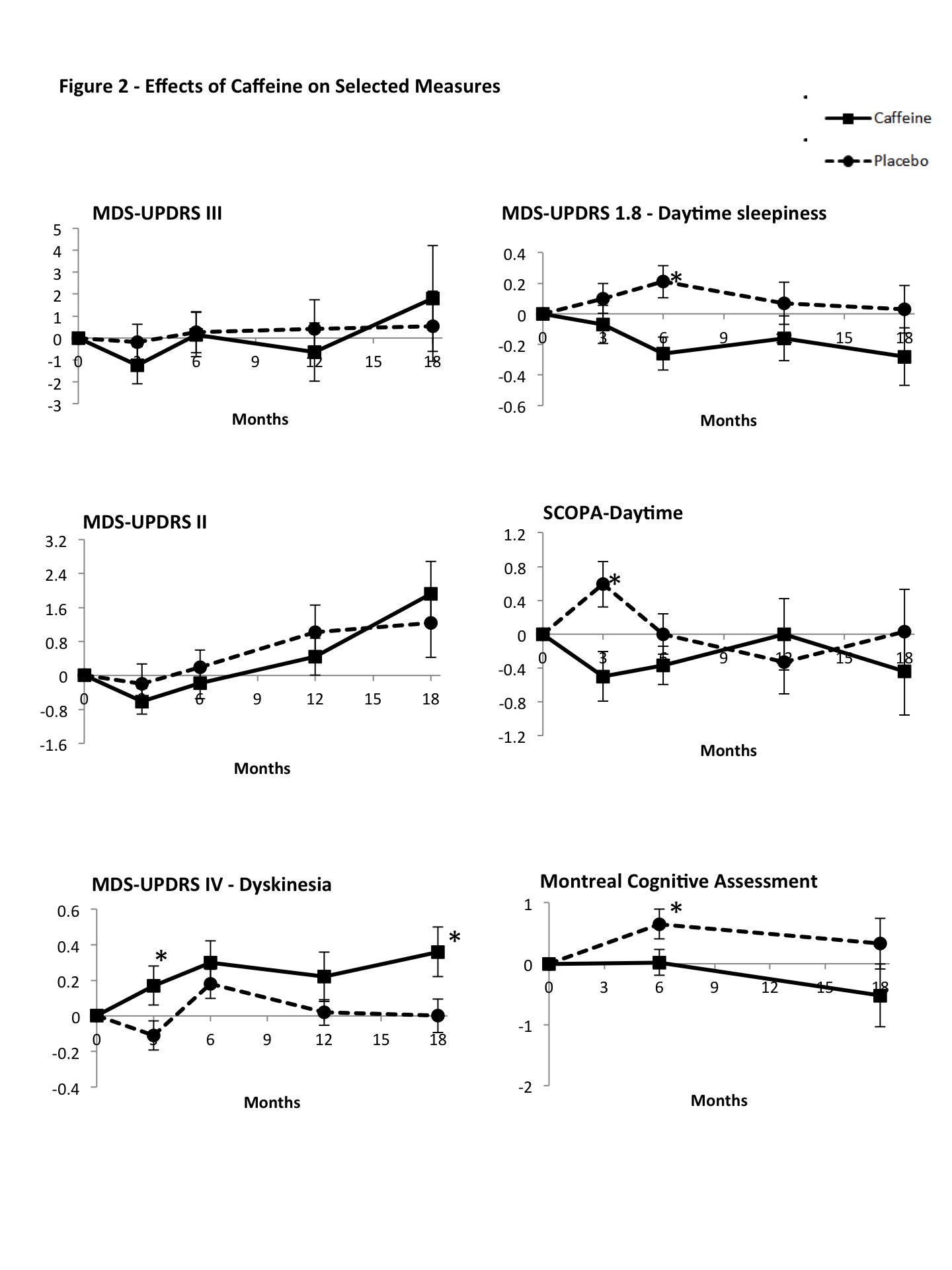Session Information
Date: Thursday, June 8, 2017
Session Title: Parkinson’s Disease: Clinical Trials, Pharmacology And Treatment
Session Time: 1:15pm-2:45pm
Location: Exhibit Hall C
Objective: To assess the effects of caffeine on patients with Parkinson’s disease.
Background: Multiple studies have linked use of caffeine, an adenosine antagonist, to a lower risk of Parkinson’s disease (PD). In order to understand the mechanism for this effect, the tolerability and symptomatic effects of caffeine in PD must be understood. In an early-phase randomized trial of caffeine we found potential benefit of caffeine on motor symptoms and somnolence in PD, but this finding remains unproven.
Methods: In this parallel-group controlled trial, PD patients with 1-8 years disease duration, Hoehn and Yahr Stages I-III, on stable symptomatic therapy were randomized to caffeine 200mg BID vs. matching placebo capsules for 6-18 months. The primary outcome was the change in MDS-UPDRS Part III at 6 months. Secondary outcomes included safety and tolerability, MDS-UPDRS Parts I, II and IV, measures of somnolence and insomnia, cognition as assessed by the Montreal Cognitive Assessment (MoCA) clinical global impression of change, and quality of life.
Results: 60 patients received caffeine and 61 placebo. Caffeine was well-tolerated with similar prevalence of side effects as placebo. There was no significant difference in motor parkinsonism (the primary outcome) with caffeine compared to placebo (difference between groups -0.48 [95%CI=-3.21,2.25] points on MDS-UPDRS-III). Similarly, on secondary outcomes, there was no change in motor signs or motor symptoms (MDS-UPDRS-II) at any other time point, and no difference on quality of life measures. There was a slight improvement in somnolence over the first 6 months, which attenuated over longer time points. However, there was a slight increase in dyskinesia with caffeine (average all time points=0.25 [0.04,0.45] points higher on MDS-UPDRS-IV-dyskinesia items 4.1+4.2), and caffeine was associated with worse cognitive testing scores (average MoCA=0.66 [0.01,1.32] worse than placebo). [figure]
Conclusions: Caffeine does not provide clinically-important improvement of motor symptoms of PD. It may have temporary alerting effects, but may also slightly worsen cognitive function and dyskinesia.
To cite this abstract in AMA style:
R. Postuma, J. Anang, A. Pelletier, M. Moscovich, D. Grimes, A. Borys, S. Furtado, R. Munhoz, S. Cresswell, A. Moro, D. Hobson, L. Joseph, A. Lang. Caffeine as a Treatment for Parkinson’s Disease: A Randomized Controlled Trial (CafePD) [abstract]. Mov Disord. 2017; 32 (suppl 2). https://www.mdsabstracts.org/abstract/caffeine-as-a-treatment-for-parkinsons-disease-a-randomized-controlled-trial-cafepd/. Accessed December 15, 2025.« Back to 2017 International Congress
MDS Abstracts - https://www.mdsabstracts.org/abstract/caffeine-as-a-treatment-for-parkinsons-disease-a-randomized-controlled-trial-cafepd/

